Tchaikovsky: Cherevichki (Polianichko)
Introduction
Nicolai Gogol's short story, Christmas Eve (1831) has spawned several works in its wake, including two films, and even Tchaikovsky had two attempts at it in the forms of the opera Vakula the Smith (1876), and here, in a hugely revised and renamed version from 1885.
The alternative title, for this production anyway, is The Tsarina's Slippers. This is a misnomer as 'Cherevichki' are apparently little high-heeled boots. So you have at least learned something from this review.
The plot follows the original storyline quite closely, and as is common with Gogol's tales, there are mystical and fantastical elements, together with human drama and a liberal sprinkling of Ukrainian 'folkiness' of which the ruling classes were very fond.
The Devil is annoyed. He is particularly annoyed with the young smith, Vakula, who has painted rather unflattering pictures of him on the church. Luckily,Vakula's mother. Solokha, is a witch, and is enjoying the evening sitting on her roof. The Devil flirts with her, but also plans revenge by trying to force Chub, the father of Vakula's sweetheart, to stay indoors so Vakula isn't able to see her. The huge snowstorm he whips up means Chub and his mate Panas get lost on their way to the pub and have to get back home.
In the meantime, Chub's daughter Oxana is sitting alone in the house, thinking about how lovely she is. Vakula turns up and is teased by the young girl. Chub and Panas arrive unexpectedly but being covered in snow, are thrown out by Vakula as he doesn't recognise them. Oxana is annoyed and throws him out as well.
To cut a rather meandering story slightly shorter, Vakula tricks the Devil into taking him to St Petersburg so he can procure a pair of the slippers that would only be worn by the Tsarina (actually Catherine the Great). This would be a present that would make a certain young lady marry him, especially as she asked for them specifically, albeit jokingly.
The Imperial Russian Court appears to allow anyone in nowadays, so Vakula is given an audience with the Tsarina's minister, Prince Potemkin. He and the courtiers are suitably amused by this scruffy little Ukranian yokel, and make up a pair especially for him.
Meanwhile, Oxana and Solokha are mourning Vakula as they think he's killed himself, but he turns up at the right moment, asks for Chub's forgiveness, offers the slippers to Oxana, who claims she only wanted Vakula and not a present. Chub gives the couple his blessing and there is general rejoicing and dancing.
This production of Cherevichki was recorded at the Royal Opera House over two nights in the November 2009 and formed part of their Christmassy offerings. The first thing I need to say about this work is that it was completely new to me before I received the DVD. I even missed news of it when it was on, and so all reviews at the time went the way of all recycled newspapers.
This is probably a lucky thing, as many of the initial reviews were not at all favourable. Judging by the recording we have here though, things seemed to have settled down over the two nights from which it was put together and overall, it's a rather fine disc.
Audio & Visual
The DTS sound is excellent, picking up a huge amount of detail within Tchaikovsky's orchestration and creating a great balance with most of the voices on stage. Any instances of singers fading away are more to do with their own voices than anything else.Visually, the whole production is a treat and there is nothing to complain about with the disc's reproduction of the vividness of the sets and costumes.
Extras
Rather disappointing sound bites from conductor, director and principal cast members, which tell us little extra about the work. The article by John Snelson within the accompanying booklet is more substantial.Conclusion
Reportedly Tchaikovsky's favourite of his operas, Cherevichki certainly contains some gorgeous moments, but for me, much of the music is full of unfulfilled potential with great swathes of the score full of semi-remembered tunes you may have heard from other more familiar works. The Overture is a case in point with the melodic ideas trying very hard to get somewhere, but failing almost straight away.But, and there is always a but, Oxana's meditation on how lovely she is, 'Tsvela yablonka…' is utterly charming, and 'O Bozhe!...' towards the end of Act II is up there with the best of Romantic music, so I think there will be much to admire if you're in the mood to explore 'new' Tchaikovsky.
Alexander Polianichko is an enthusiastic champion of this work, and his interpretation is, for the most part, quite convincing. I had the feeling that the overture could have had a little more of a push, but perhaps this was the exact tempo the composer wanted, but then again, perhaps the composer was wrong. The orchestra of the ROH play the music as if it were as familiar as Sleeping Beauty or Onegin, and it's a pleasure to listen to them.
Singing-wise, it's not at all bad and it's always good to hear a Russian libretto with Tchaikovsky's music sung by those who have been brought up speaking the language. Of course, the style of singing quite often creates a vibrato as wide as the Channel Tunnel but there's little doubt about the passion involved.
The pretty hefty role of Oxana is expertly sung by the very picturesque Olga Guryakova, performing with a nice mix of girlish charm and 'knowingness'. A tendency to be slightly shrill is therefore forgiven. Her lover, Vakula, is sung by the excellent Vsevolod Grivnov who has a voice suited to far more substantial roles, but it is clear and ringing. It would be interesting to hear him in a more Italianate role.
Vladmir Matorin is a powerful and impressive Chub, and the 'comedic' partnership of Solokha (Larissa Diadkova) and The Devil (Maxim Mikhailov) is reasonably entertaining, although less effort on hamming it up and more on getting your voice across (especially in the case of Mikhailov) would have been better.
The highlight of this production is the production itself. The scenery is stunning, coming straight out of the mind of children's book illustrator Mikhail Mokrov, and appearing simple and colourful, yet as only a film camera can see, the detail is fantastic and when we reach the Imperial palace, the gloves are off and we hit the height of opulence.
The other huge advantage in the performance is the use of the Royal Ballet in those sections designated for dance, and with their contribution, the whole production becomes a real theatrical experience. Mara Galeazzi and Gary Avis change their appointed roles with ease, and when the 'Cossacks' hit the floor (one of whom is actually a Cossack) the audience go wild, and rightly so.
This is a great DVD (extras not-included) of a work which is wrongfully neglected, yet which doesn't quite hit the heights of true greatness, but if you enjoy the 'old-fashioned' theatrical experience and especially if you thought you knew all the Tchaikovsky you needed, then this is one to check out.
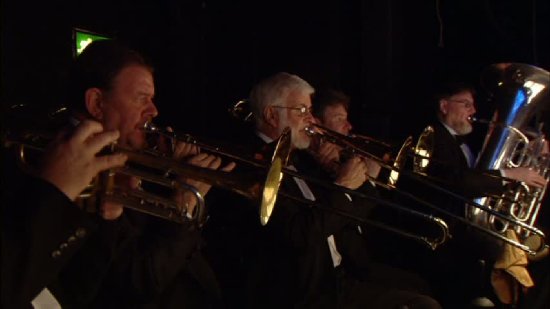
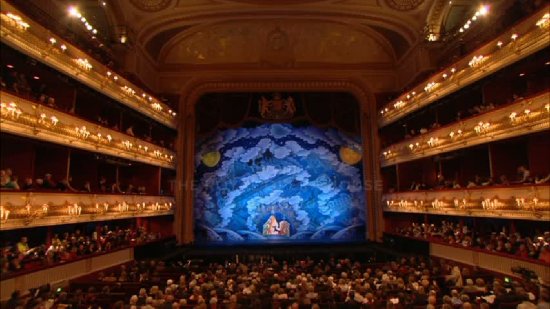
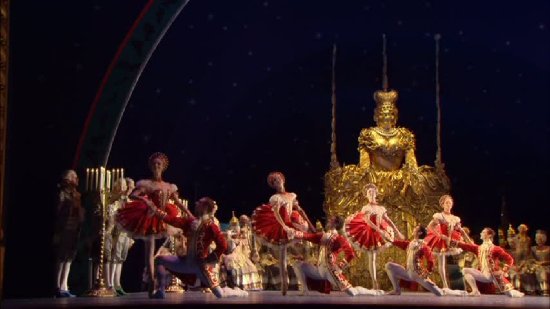
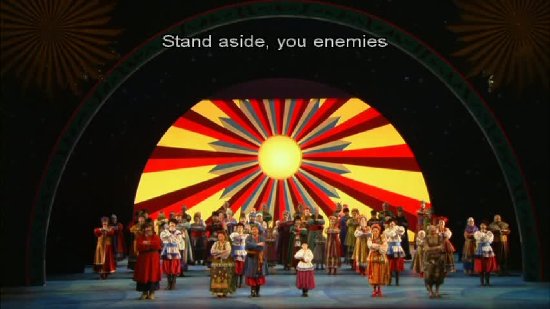
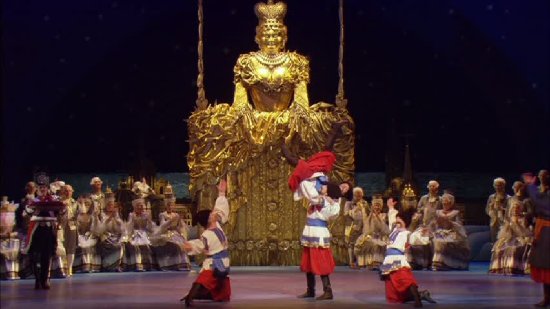
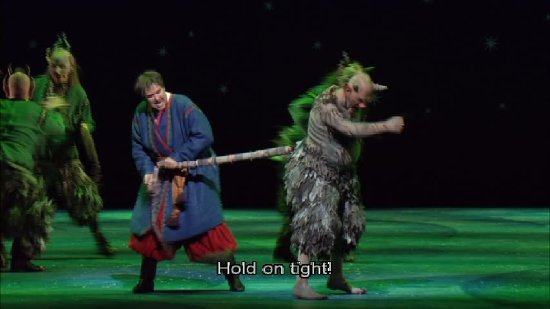
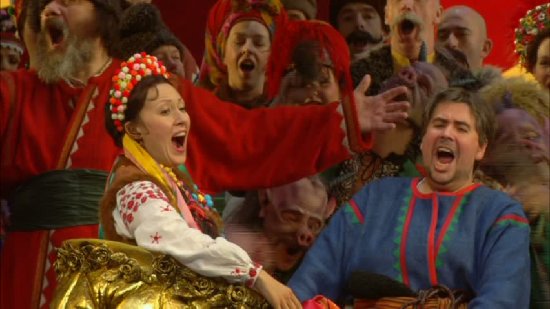
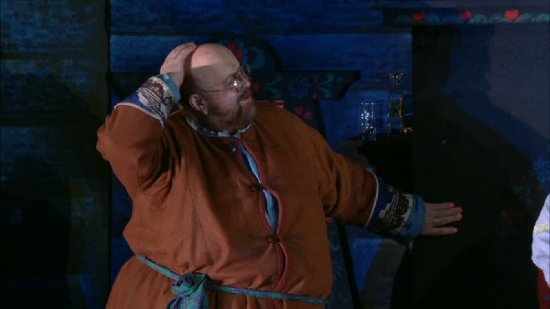
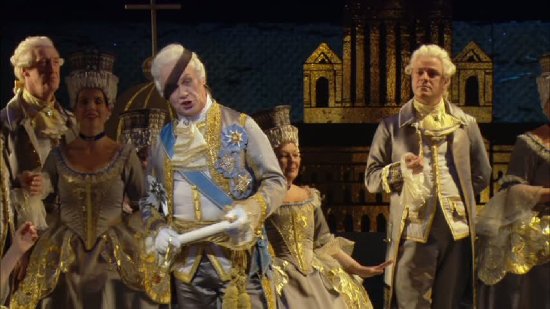
Your Opinions and Comments
Be the first to post a comment!